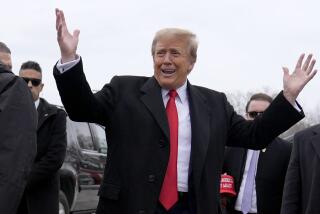PUBLIC OPINION : Presidents’ Pollsters: Who Follows Whom? : Critics worry that political surveyors now have too much influence. Clinton’s is often at the White House.
- Share via
WASHINGTON — It began in earnest with John F. Kennedy. Now, 33 years later, public opinion polling has become a fixture in American government--so much so that even pollsters quarrel over whether they have become too influential in shaping public policy.
Some pollsters point out that President Clinton’s pollster, Stanley B. Greenberg, is one of his most important advisers. And given Clinton’s enthusiasm for compromise, some political observers suspect that even a few of the President’s longest-held policy agendas--welfare reform for example--may owe more to political fashion than to Clinton’s fundamental values.
Beyond Clinton, pollsters ask, what happens to leadership when technology allows politicians to pretest ideas before deciding on a course of action? Does polling encourage politicians to avoid risk and lead them away from solving tough problems? Is survey research part of political gridlock?
*
Is the country well-served if politicians behave like the one in the old joke who said: “There go the people. I must follow them. I am their leader.”
Over the years, the influence of pollsters in the White House has ebbed and flowed. Louis Harris, who helped pioneer campaign polling for Kennedy in 1960, was not employed by the Kennedy Administration, but he spoke with the President several times a week.
Kennedy thought “you ruled within the jaws of consent of the governed,” Harris said, but you made decisions first “on the merits” and then looked around to see whether you are within the jaws of consent. “Polls had a following, not a commanding role,” he told a gathering of presidential pollsters recently at the conservative American Enterprise Institute in Washington.
President Jimmy Carter’s pollster, Patrick Caddell, was one of Carter’s closest advisers. But he contends Carter’s inner circle distinguished between his role as a policy adviser and pollster. “I don’t think polling had any great influence on policy,” he said. Caddell’s detractors think the opposite, however, and blame some of Carter’s problems on Caddell’s influence.
*
President Ronald Reagan’s pollster, Richard B. Wirthlin, met with the President 26 times during Reagan’s first year, yet maintained that the Administration’s agenda was always set by Reagan’s values, which themselves were the source of his popularity.
Polls played a more prominent role in George Bush’s White House, so much so that Bush pollster Robert M. Teeter eventually became chairman of the Republican National Committee and ran Bush’s reelection campaign--both moves, some argue, that reflected Bush’s lack of leadership.
And in the Clinton White House, Greenberg is certainly more involved than many of his predecessors. Greenberg, who has a reputation as a careful pollster without any particular policy agenda, said he meets with the President several times a week and is often at the White House on a daily basis.
Is it too much? Greenberg argues that polling has become more important because pervasive public cynicism and the decline of political parties has made governing more difficult.
“We are in a period of great cynicism. Bill Clinton had a disapproval rate of 24% the day he took office. The major ideas of both parties have largely collapsed. And we are trying to further a bold agenda,” Greenberg says.
Accomplishing that agenda, he argues, “is not simply a matter of presenting a policy proposal, sending it to Congress and letting Congress do its work. Now you need an effort to keep the American public with you.”
Even some Clinton critics agree that public cynicism complicates governing, and they concede, too, that presidents have a harder time leading today because they must compete with news, talk and entertainment shows on 50 TV channels that help shape the agenda. When Kennedy governed, the nightly news was 15 minutes, and Kennedy could command the nation’s rapt attention with a brief televised appearance.
Polls have two appropriate roles in the White House, argued Fred Steeper, a highly regarded pollster who worked under Teeter for Bush:
First, to discover the public’s priorities (crime, the deficit, health care, etc.), and second, to measure reaction to the policy choices the President makes.
Polling becomes questionable, Steeper said, when used to make the policy choices.
Clinton has been aggressive in using polls for political strategy, most recently in finding an opportunity to damage Ross Perot.
“We found that Perot voters use him as a political reformer. Issues like the North American Free Trade Agreement are not those kinds of issues,” Greenberg said. “So we made a strategic decision to engage Perot in some way . . . before the NAFTA debate was over.”
Thus the debate between Vice President Al Gore and Perot on CNN was born.
More to Read
Get the L.A. Times Politics newsletter
Deeply reported insights into legislation, politics and policy from Sacramento, Washington and beyond. In your inbox twice per week.
You may occasionally receive promotional content from the Los Angeles Times.








